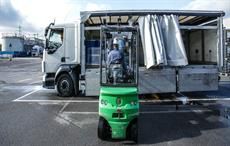UK companies supplying personal protective equipment (PPE) have started feeling the strain on certain PPE items as the Covid-19 coronavirus outbreak is causing problems for supply chain directors, according to Richard Wilding, professor of supply chain strategy at Cranfield University, who feels the situation needs to be monitored.
“As shortages in pharmacies and chemists start to bite, consumers are reported to be turning to building hardware suppliers for face masks and body suits. This means builders, tilers and plasterers or other workers who regularly use masks for protection against airborne particulate matter, for instance, are struggling to get hold of this equipment from certain suppliers,” he said in a press release by the university.Companies in the United Kingdom supplying personal protective equipment (PPE) have started feeling the strain on certain PPE items as the Covid-19 coronavirus outbreak is causing problems for supply chain directors, according to Richard Wilding, professor of supply chain strategy at Cranfield University, who feels the situation needs to be monitored.#
As the construction industry relies on this PPE for people to carry out their work, without such equipment, employees are unable to work and companies are subsequently unable to undertake work, he said. “The issue where a seemingly unrelated supply chain channel causes disruption is known as a ‘supply chain parallel interaction’, he said.
In this case, the consumer supply of medical face masks is drying up, so customers turn to industry sources – causing shortages in their supply chain as a knock-on effect, thus disrupting a seemingly unrelated industry or sector, he said.
News of the Covid-19 virus striking in Italy brings more problems for supply chain directors. Northern Italy is an industrial heartland, a key manufacturing hub for Europe known for its strong textile, steel and chemical sectors. With the news that Austria briefly stopped trains from Italy, smooth freight transport across Europe can now potentially become a risk factor, he said.
Though businesses that have effective supply chain resilience approaches embedded will be prepared for challenges like this, others that don’t have this approach will respond ineffectively and see the impact on their bottom line, he added.
Fibre2Fashion News Desk (DS)


